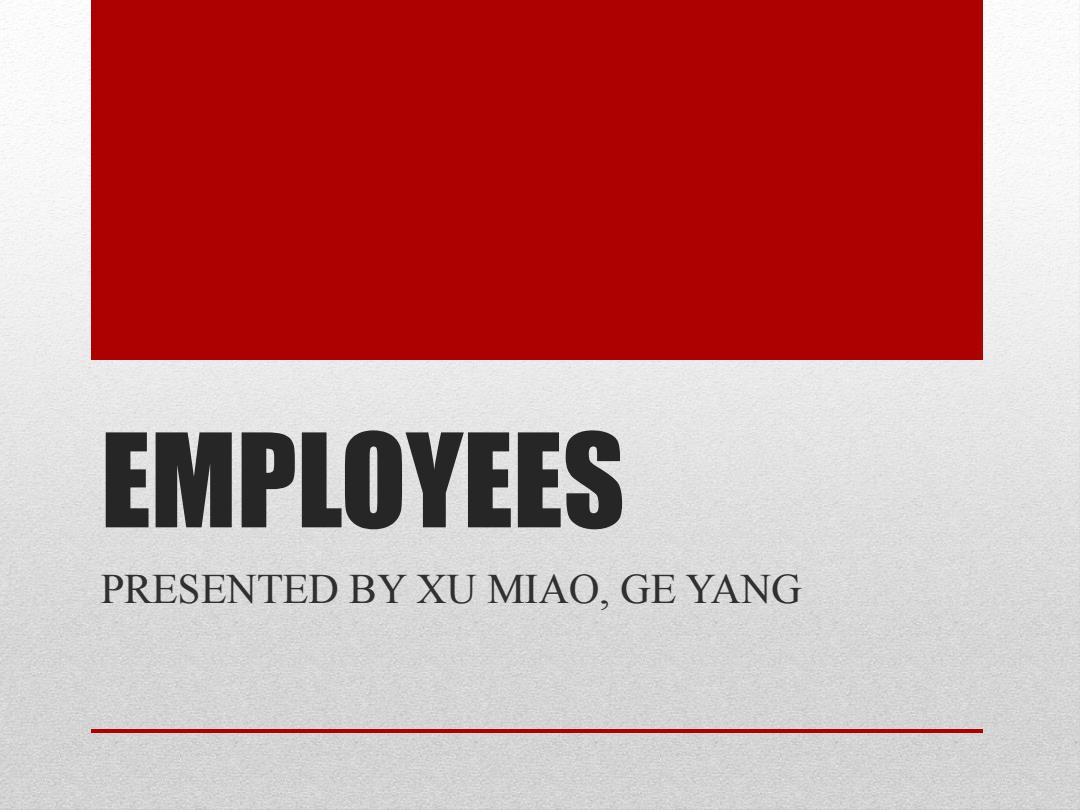
EMPLOYEES PRESENTED BY XU MIAO.GE YANG
EMPLOYEES PRESENTED BY XU MIAO, GE YANG
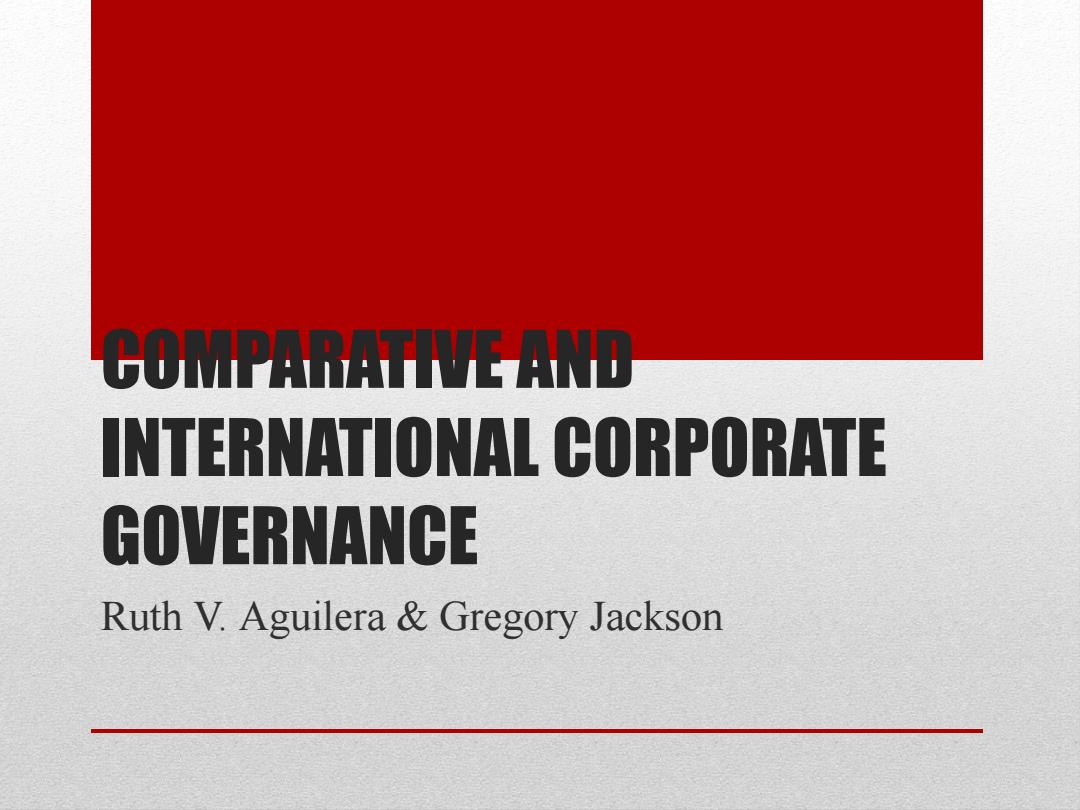
GOMFARATTUL AND INTERNATIONAL CORPORATE GOVERNANCE Ruth V.Aguilera Gregory Jackson
COMPARATIVE AND INTERNATIONAL CORPORATE GOVERNANCE Ruth V. Aguilera & Gregory Jackson
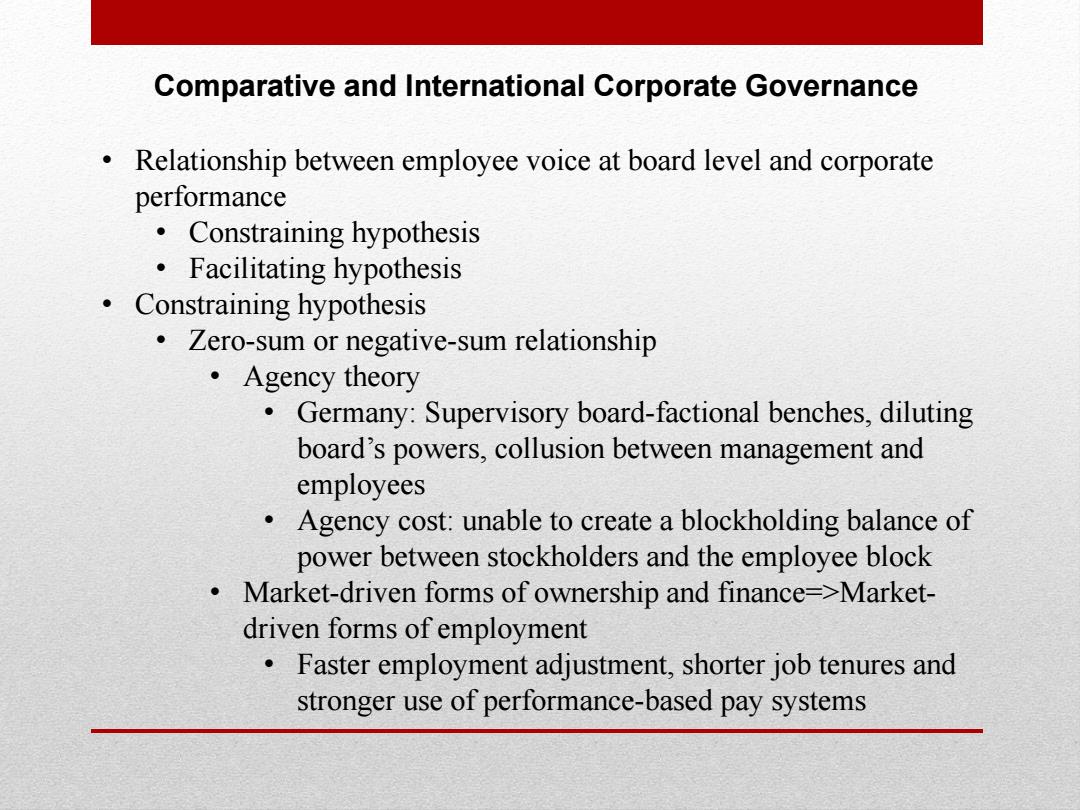
Comparative and International Corporate Governance Relationship between employee voice at board level and corporate performance Constraining hypothesis Facilitating hypothesis Constraining hypothesis Zero-sum or negative-sum relationship ·Agency theory Germany:Supervisory board-factional benches,diluting board's powers,collusion between management and employees Agency cost:unable to create a blockholding balance of power between stockholders and the employee block Market-driven forms of ownership and finance->Market- driven forms of employment Faster employment adjustment,shorter job tenures and stronger use of performance-based pay systems
Comparative and International Corporate Governance • Relationship between employee voice at board level and corporate performance • Constraining hypothesis • Facilitating hypothesis • Constraining hypothesis • Zero-sum or negative-sum relationship • Agency theory • Germany: Supervisory board-factional benches, diluting board’s powers, collusion between management and employees • Agency cost: unable to create a blockholding balance of power between stockholders and the employee block • Market-driven forms of ownership and finance=>Market- driven forms of employment • Faster employment adjustment, shorter job tenures and stronger use of performance-based pay systems
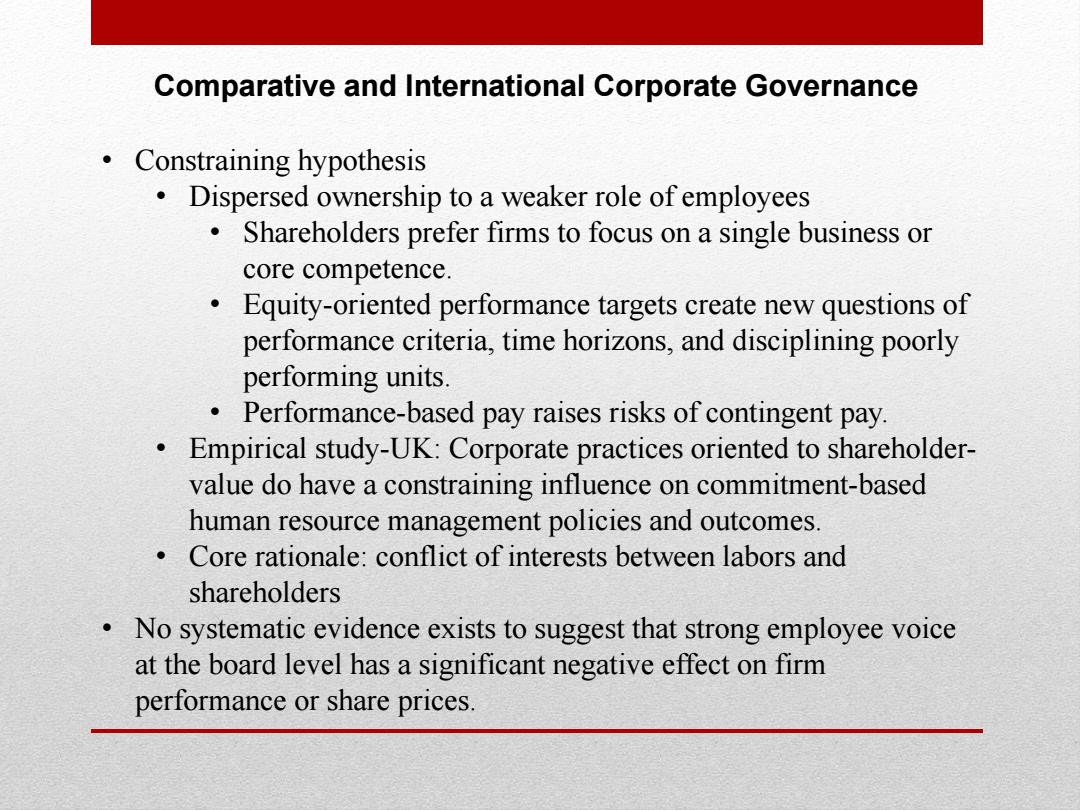
Comparative and International Corporate Governance Constraining hypothesis Dispersed ownership to a weaker role of employees Shareholders prefer firms to focus on a single business or core competence. Equity-oriented performance targets create new questions of performance criteria,time horizons,and disciplining poorly performing units. Performance-based pay raises risks of contingent pay. Empirical study-UK:Corporate practices oriented to shareholder- value do have a constraining influence on commitment-based human resource management policies and outcomes. Core rationale:conflict of interests between labors and shareholders No systematic evidence exists to suggest that strong employee voice at the board level has a significant negative effect on firm performance or share prices
• Constraining hypothesis • Dispersed ownership to a weaker role of employees • Shareholders prefer firms to focus on a single business or core competence. • Equity-oriented performance targets create new questions of performance criteria, time horizons, and disciplining poorly performing units. • Performance-based pay raises risks of contingent pay. • Empirical study-UK: Corporate practices oriented to shareholder- value do have a constraining influence on commitment-based human resource management policies and outcomes. • Core rationale: conflict of interests between labors and shareholders • No systematic evidence exists to suggest that strong employee voice at the board level has a significant negative effect on firm performance or share prices. Comparative and International Corporate Governance
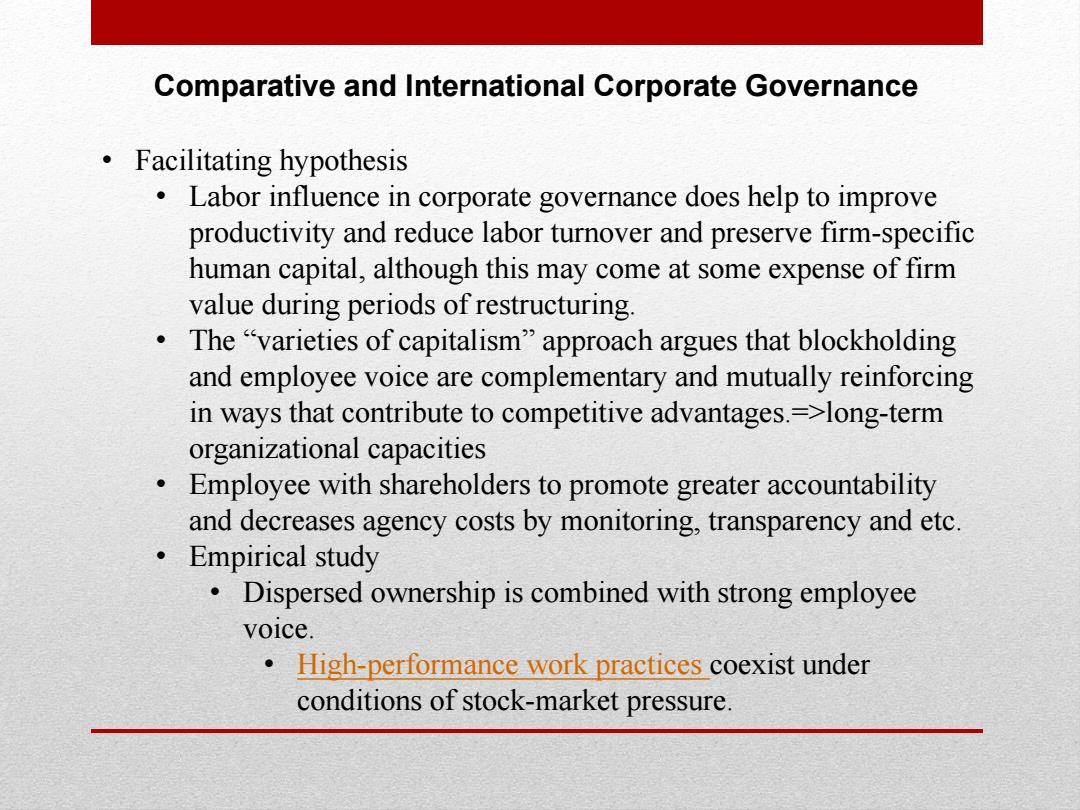
Comparative and International Corporate Governance Facilitating hypothesis Labor influence in corporate governance does help to improve productivity and reduce labor turnover and preserve firm-specific human capital,although this may come at some expense of firm value during periods of restructuring. The"varieties of capitalism"approach argues that blockholding and employee voice are complementary and mutually reinforcing in ways that contribute to competitive advantages.=>long-term organizational capacities Employee with shareholders to promote greater accountability and decreases agency costs by monitoring,transparency and etc. ·Empirical study Dispersed ownership is combined with strong employee voice. High-performance work practices coexist under conditions of stock-market pressure
• Facilitating hypothesis • Labor influence in corporate governance does help to improve productivity and reduce labor turnover and preserve firm-specific human capital, although this may come at some expense of firm value during periods of restructuring. • The “varieties of capitalism” approach argues that blockholding and employee voice are complementary and mutually reinforcing in ways that contribute to competitive advantages.=>long-term organizational capacities • Employee with shareholders to promote greater accountability and decreases agency costs by monitoring, transparency and etc. • Empirical study • Dispersed ownership is combined with strong employee voice. • High-performance work practices coexist under conditions of stock-market pressure. Comparative and International Corporate Governance
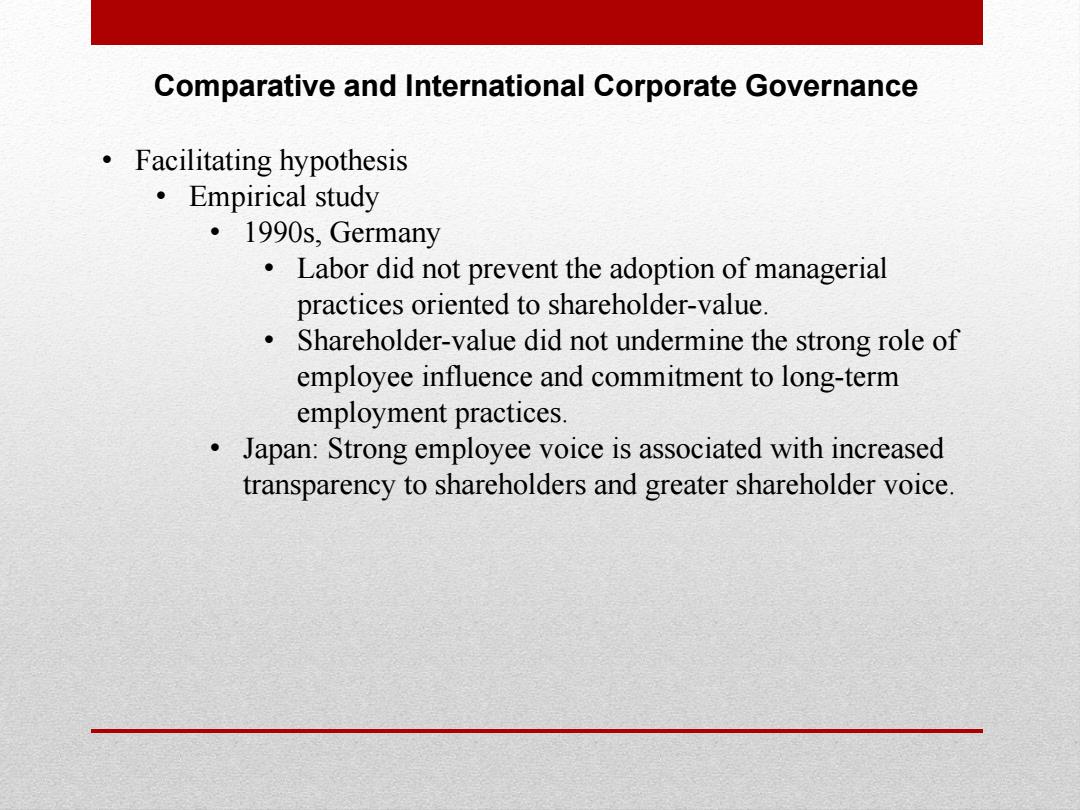
Comparative and International Corporate Governance Facilitating hypothesis ·Empirical study ·1990s,Germany Labor did not prevent the adoption of managerial practices oriented to shareholder-value. Shareholder-value did not undermine the strong role of employee influence and commitment to long-term employment practices. Japan:Strong employee voice is associated with increased transparency to shareholders and greater shareholder voice
• Facilitating hypothesis • Empirical study • 1990s, Germany • Labor did not prevent the adoption of managerial practices oriented to shareholder-value. • Shareholder-value did not undermine the strong role of employee influence and commitment to long-term employment practices. • Japan: Strong employee voice is associated with increased transparency to shareholders and greater shareholder voice. Comparative and International Corporate Governance
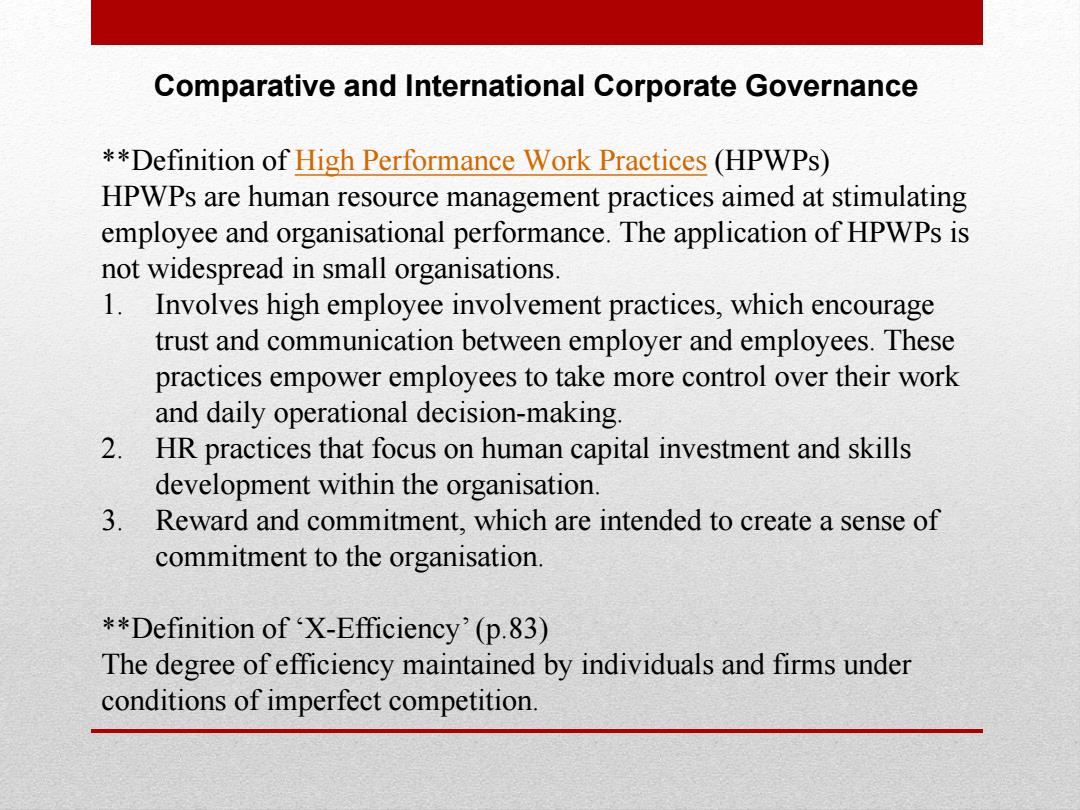
Comparative and International Corporate Governance **Definition of High Performance Work Practices(HPWPs) HPWPs are human resource management practices aimed at stimulating employee and organisational performance.The application of HPWPs is not widespread in small organisations. 1.Involves high employee involvement practices,which encourage trust and communication between employer and employees.These practices empower employees to take more control over their work and daily operational decision-making. 2. HR practices that focus on human capital investment and skills development within the organisation. 3. Reward and commitment,which are intended to create a sense of commitment to the organisation. **Definition ofX-Efficiency'(p.83) The degree of efficiency maintained by individuals and firms under conditions of imperfect competition
**Definition of High Performance Work Practices (HPWPs) HPWPs are human resource management practices aimed at stimulating employee and organisational performance. The application of HPWPs is not widespread in small organisations. 1. Involves high employee involvement practices, which encourage trust and communication between employer and employees. These practices empower employees to take more control over their work and daily operational decision-making. 2. HR practices that focus on human capital investment and skills development within the organisation. 3. Reward and commitment, which are intended to create a sense of commitment to the organisation. **Definition of ‘X-Efficiency’ (p.83) The degree of efficiency maintained by individuals and firms under conditions of imperfect competition. Comparative and International Corporate Governance
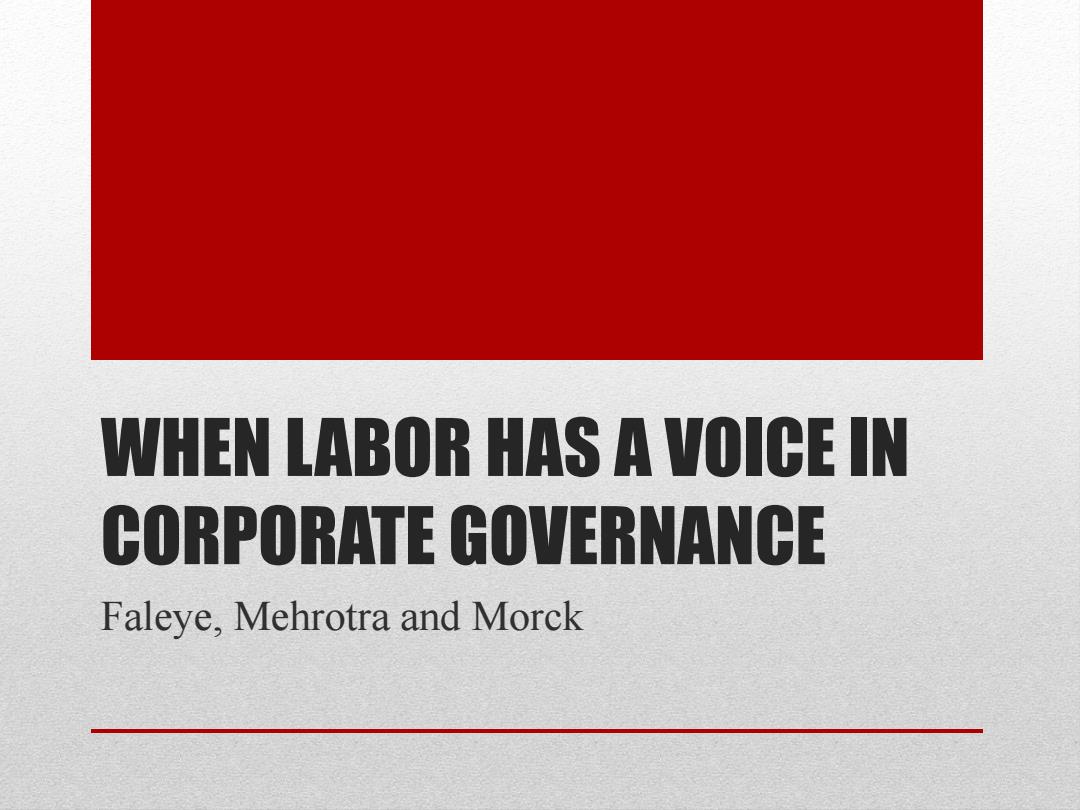
WHEN LABOR HAS A VOIGE IN CORPORATE GOVERNANCE Faleye,Mehrotra and Morck
WHEN LABOR HAS A VOICE IN CORPORATE GOVERNANCE Faleye, Mehrotra and Morck
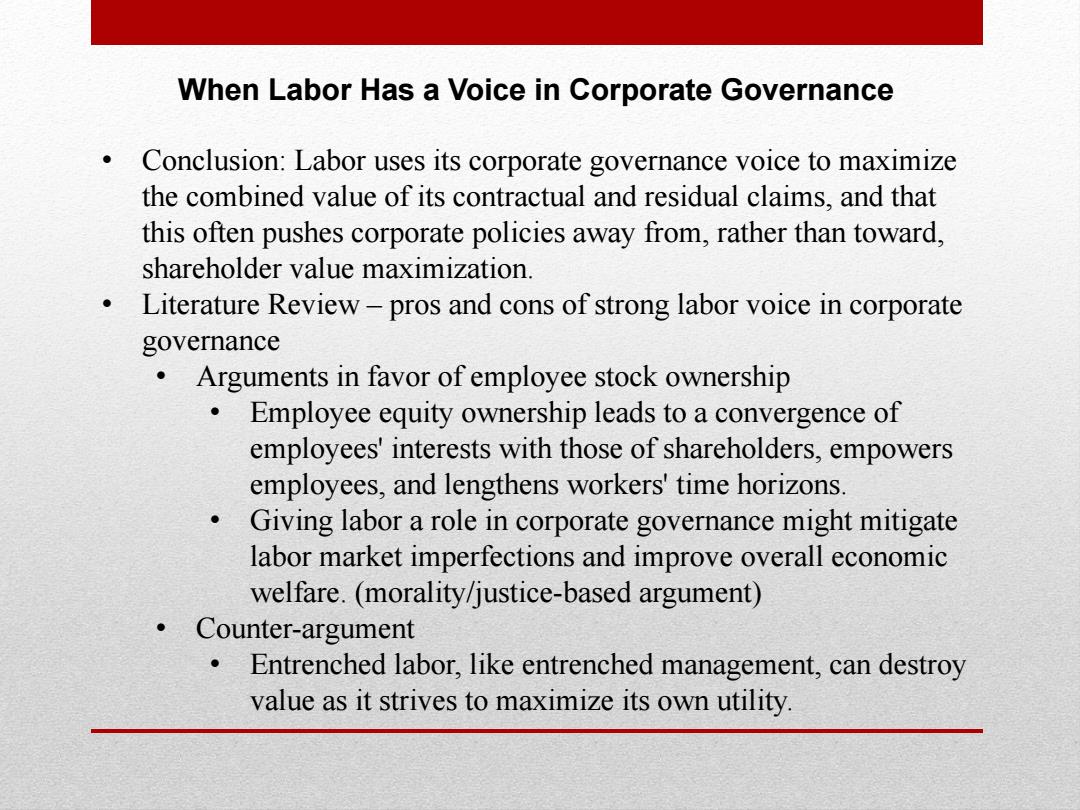
When Labor Has a Voice in Corporate Governance Conclusion:Labor uses its corporate governance voice to maximize the combined value of its contractual and residual claims,and that this often pushes corporate policies away from,rather than toward, shareholder value maximization. Literature Review-pros and cons of strong labor voice in corporate governance Arguments in favor of employee stock ownership Employee equity ownership leads to a convergence of employees'interests with those of shareholders,empowers employees,and lengthens workers'time horizons. Giving labor a role in corporate governance might mitigate labor market imperfections and improve overall economic welfare.(morality/justice-based argument) 0 Counter-argument Entrenched labor,like entrenched management,can destroy value as it strives to maximize its own utility
When Labor Has a Voice in Corporate Governance • Conclusion: Labor uses its corporate governance voice to maximize the combined value of its contractual and residual claims, and that this often pushes corporate policies away from, rather than toward, shareholder value maximization. • Literature Review – pros and cons of strong labor voice in corporate governance • Arguments in favor of employee stock ownership • Employee equity ownership leads to a convergence of employees' interests with those of shareholders, empowers employees, and lengthens workers' time horizons. • Giving labor a role in corporate governance might mitigate labor market imperfections and improve overall economic welfare. (morality/justice-based argument) • Counter-argument • Entrenched labor, like entrenched management, can destroy value as it strives to maximize its own utility
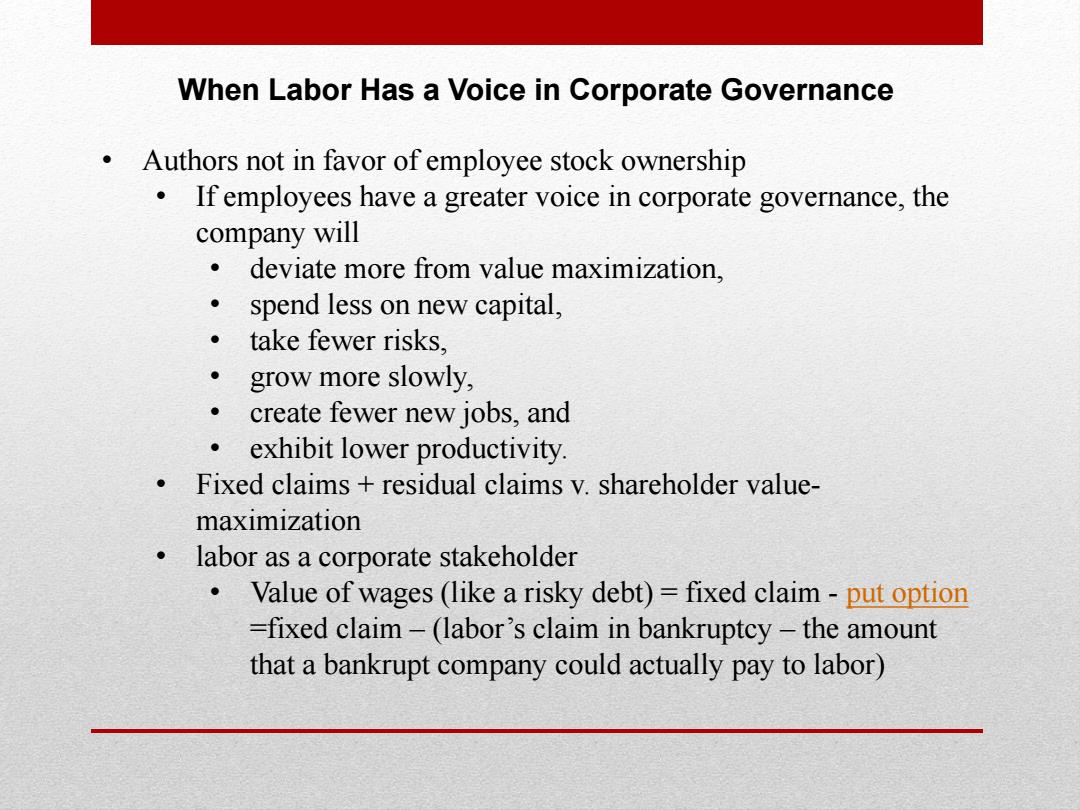
When Labor Has a Voice in Corporate Governance Authors not in favor of employee stock ownership If employees have a greater voice in corporate governance,the company will deviate more from value maximization, spend less on new capital, take fewer risks, grow more slowly, create fewer new jobs,and exhibit lower productivity. Fixed claims residual claims v.shareholder value- maximization labor as a corporate stakeholder Value of wages(like a risky debt)=fixed claim-put option =fixed claim-(labor's claim in bankruptcy-the amount that a bankrupt company could actually pay to labor)
When Labor Has a Voice in Corporate Governance • Authors not in favor of employee stock ownership • If employees have a greater voice in corporate governance, the company will • deviate more from value maximization, • spend less on new capital, • take fewer risks, • grow more slowly, • create fewer new jobs, and • exhibit lower productivity. • Fixed claims + residual claims v. shareholder value- maximization • labor as a corporate stakeholder • Value of wages (like a risky debt) = fixed claim - put option =fixed claim – (labor’s claim in bankruptcy – the amount that a bankrupt company could actually pay to labor)